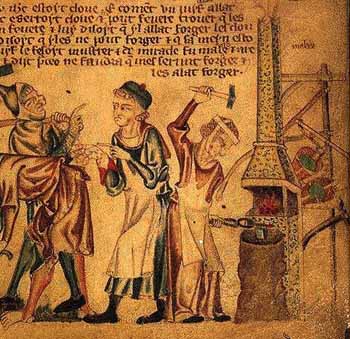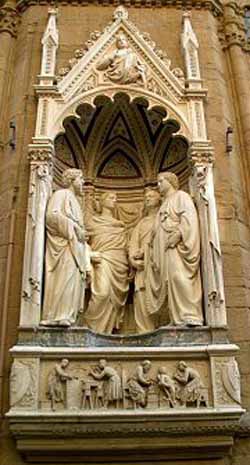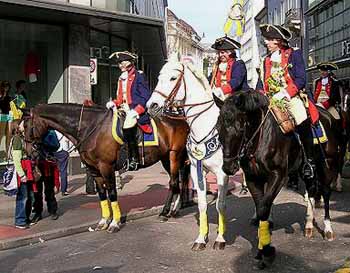 |
Organic Society
All Classes Should Have Elites
Plinio Corrêa de Oliveira
In the Portuguese language there is a distinction between a university professor and a master. Although he is not a professor with the higher authority that accompanies that title, the master attracts disciples by his influence and prestige. These disciples are men who come to him to follow his thinking.

A master blacksmith gives instructions to his workers |
The professor has the power proper to the teaching profession. But the master has another type of prestige inherent to the teaching profession and can exert so much influence that it even supersedes that of the professor. Sometimes the highest levels of a profession are held not by those with all the appropriate titles, but by those who stand out for their superior attributes.
In the Middle Age, when artisan work was the means of industrial production, the man in charge of a particular workshop who excelled in its craft would exert an influence similar to that of a university master over his disciples. This is why he was called guild master. Others would come to be under his wings, following the feudal custom of a subordinate relying on his superior. Inside a city the guild master was, in a certain way, the reflection of the feudal lord in the countryside. The guilds in the cities were, one might say, daughters of the countryside fief. It is disputable whether the guilds would have been born had the fiefs not existed.
Actually, the guilds had feudal characteristics. An apprentice sought the protection of a master and was treated as a member of his family, receiving a moral formation along with the technical instruction. He learned the craft principally by listening and following the example of the master. For this reason, very few documents exist describing the methods and systems of the artisan production of that time.
I believe that this way of teaching and producing is much more organic and sacral than others that came later. Today the only concern in production is to make money. There is no master. He was replaced by a specialist who is hired to teach workers to perform their specific labors and is paid by the hour.
Feudal origins of the guilds
Before the growth of the cities, industry and commerce developed inside the fief. Both the producer and the consumer market were found there. It was a very
closed economy.
We can ask ourselves if there could be a type of technological progress that would be compatible with those feudal bonds and not adhere to the
revolutionary ferment, which appeared to have entered very soon into the commercial guilds of the city. Indeed, there is no doubt that the feudal ambience was very good and propitious to the constitution of the guilds, but it is not the only possibility for an organic structure, nor the only licit one. We would be rejecting reality if we were to deny this.
The religious character of most guilds

The Florence guild of stone & wood sculptors chose as patrons four martyrs who refused to sculpt idols under Diocletian |
A defect in industry to be combated is the existence of the isolated individual with no relations with others, one who does not belong to any ordered, hierarchical structure. With the guilds, this did not occur, because they engaged the whole life of the individual around religious associations, or confraternities. At least this is what the historians sustained until the 1980s, when I stopped reading them. I do not know what they wrote after that.
The confraternity of carpenters, for example, taking into consideration that the Church named St. Joseph as the patron saint of their métier, would adopt the feast day of St. Joseph as their own. Bearing their standard with a representation of St. Joseph, all the carpenters of a village would process in the streets on that day. Moved by a principle proper to all associations – that is, an established association tends to absorb all those who have similar jobs and serve them – the confraternity developed into a temporal guild, while conserving its religious nucleus.
Often guilds originated from such confraternities. When they did not, when the religious purpose was added, it would perfectly complete the goals of the guild. The spiritual aim harmonized naturally and easily with the functional goal of the guild.
The natural elites of the guilds
Since most of the members of a workshop lived in the same neighborhood, their families interacted and socialized together, all obeying the internal hierarchy of the enterprise – constituted by the master craftsman, journeyman and apprentice. Thus it formed an organic and hierarchical body. This body was not feudal in nature, but hierarchical, and it tended to form an elite. I believe this is a key point to understand life in the medieval city.
The most experienced and confirmed experts in their field of handicraft would become masters, receive better salaries, acquire more respect and enjoy more authority. This natural
tendency toward perfection in one’s craft naturally established the different level between the master and the apprentice, similar to that which existed between the noble and the plebeian.
Regarding human relations, I consider this internal process in the guilds as entirely acceptable when it was well developed. I believe that an urban life constituted by confraternities, guilds and neighborhoods was close to the ideal.
An ideal counter-revolutionary society
A counter-revolutionary society should have hierarchy among the classes. Within each class elites should exist as well, determined by those who have more knowledge of a field, capacity for the work, competence, etc. A society fully articulated by elites would represent the ideal of the Counter-Revolution.

The guild masters in Zurich have the privilege of riding horseback in their procession, while the other workers walk on foot |
The Revolution likes to present the Middle Ages and the Ancien Regime as phases of History where there were just the nobility and the rest of the people, who were despised by the nobility. It is an adulterated presentation of the reality. Actually, those periods of History generated a hierarchical society with organic elites in every field and level of society.
So, we can see that the ideal social organization has already existed. Certainly we should study how to prevent this process from being corrupted, but this is already a different problem. Our point here is that we do not need to invent another type of organization - it already existed. We only need to adapt it to new situations.
I understand that in a large society these types of human relations may be quite different. It is natural and good that such differences should emerge, depending upon the various professions and concrete works. In fact, they may well produce new forms of hierarchical human relations.
I consider this phenomenon good insofar as it comes naturally from the customs and is not planned beforehand. I have every difficulty with the technocrat who sits with his pencil and ruler and artificially draws diagrams on a piece of paper about how the classes of a society should be. Both Nazism and Communism have this same defect of artificial planning. From such schemas or any other artificial and pre-conceived plans, nothing organic and living can be born.

Posted January 18, 2010

  | | Prof. Plinio |
Organic Society was a theme dear to the late Prof. Plinio Corrêa de Oliveira. He addressed this topic on countless occasions during his life - at times in lectures for the formation of his disciples, at times in meetings with friends who gathered to study the social aspects and history of Christendom, at times just in passing.
Atila S. Guimarães selected excerpts of these lectures and conversations from the trancripts of tapes and his own personal notes. He translated and adapted them into articles for the TIA website. In these texts fidelity to the original ideas and words is kept as much as possible.

Related Topics of Interest
 The City and Its Nobility The City and Its Nobility
 An Élan for Perfection Should Exist in All Classes An Élan for Perfection Should Exist in All Classes
 How Man Should Act over His Natural Environment How Man Should Act over His Natural Environment
 Tradition, Stagnation and Progress Tradition, Stagnation and Progress
 The Natural and Unnatural Decline of the Clan The Natural and Unnatural Decline of the Clan
 Organic Society and a Desire for Heaven Organic Society and a Desire for Heaven
 The True Friends of the People Are Traditionalists The True Friends of the People Are Traditionalists
 Revolution and Counter-Revolution - Overview Revolution and Counter-Revolution - Overview

Related Works of Interest
|
|
Organic Society | Social-Political | Home | Books | CDs | Search | Contact Us | Donate

© 2002-
Tradition in Action, Inc. All Rights Reserved
|
 |
|